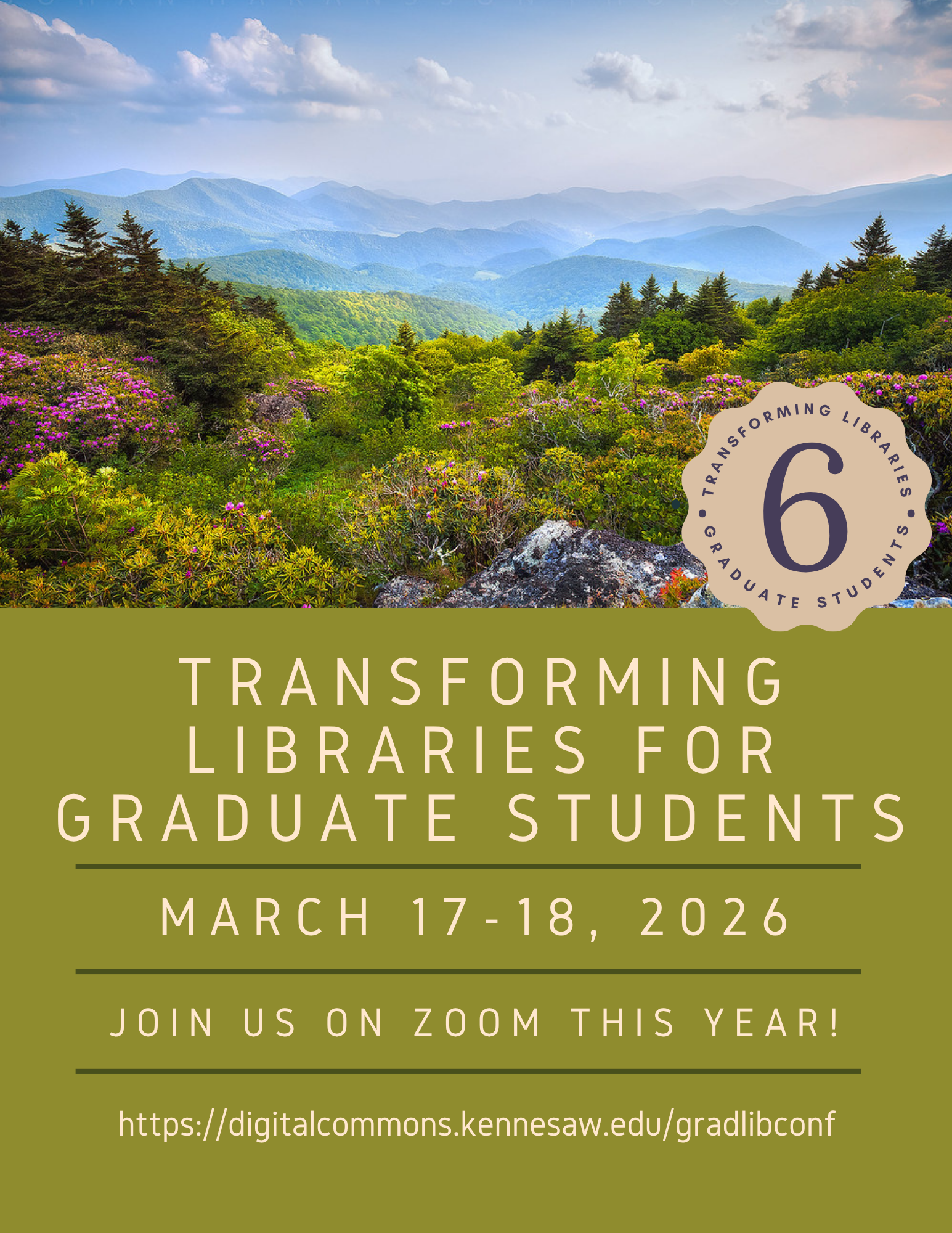Start Date
3-22-2018 9:30 AM
End Date
3-22-2018 10:00 AM
Description of Proposal
Most graduate students are required to produce theses and dissertations that make an original contribution to the field of study. This requirement informs how students and faculty approach graduate research, but colleges and universities often treat the culminating works merely as student records, not scholarly contributions encompassing original research. Librarians, however, are uniquely situated to treat graduate students as emerging participants in the scholarly communication ecosystem and to help them prepare their culminating works for an outside audience. Librarians have the expertise to advise students during the submission process with questions regarding copyright, licensing, fair use, and author’s rights, as well as the awareness to spot such issues even when students are not aware of them.
Traditionally, libraries have approached graduate theses from a collections standpoint, focusing on issues of preservation, description, and access to the finished product. Engaging with these works as they are being prepared for submission, however, reveals a variety of scholarly publishing concerns that warrant greater librarian involvement in the process of completion and final deposit. As more schools make master’s theses available online, uncertainty abounds about the appropriate use of images, responsible citation of social media, and concerns about plagiarism. Doctoral dissertations, too, are rife with scholarly communication “pain points”: graduates in the humanities may agonize over access embargoes; art historians may remove crucial images entirely from their scholarship due to copyright concerns; students in fields such as economics or biology may not realize that they have signed away their copyright to those previously-published articles they now want to include in their dissertation. Librarians are thus presented with an opportunity to discuss open access policies, fair use, and author’s rights at the student’s moment of need, not in a distant, speculative future.
Our institution recently moved responsibility for thesis and dissertation deposit from an administrative role to a librarian position. We will present our experience transforming the deposit process into a scholarly communication consultation, and will provide a first-hand report of the educational benefits of making deposit a library function, helmed by a copyright-literate librarian. This session will engage participants in an exercise to identify how and where the thesis approval process takes place on their campuses, and strategize ways to insert librarian-led scholarly communication consultations into the graduation checklist.
Handout
Included in
Not Just Degree-Seekers: Graduate Students As Scholarly Contributors
RM 460
Most graduate students are required to produce theses and dissertations that make an original contribution to the field of study. This requirement informs how students and faculty approach graduate research, but colleges and universities often treat the culminating works merely as student records, not scholarly contributions encompassing original research. Librarians, however, are uniquely situated to treat graduate students as emerging participants in the scholarly communication ecosystem and to help them prepare their culminating works for an outside audience. Librarians have the expertise to advise students during the submission process with questions regarding copyright, licensing, fair use, and author’s rights, as well as the awareness to spot such issues even when students are not aware of them.
Traditionally, libraries have approached graduate theses from a collections standpoint, focusing on issues of preservation, description, and access to the finished product. Engaging with these works as they are being prepared for submission, however, reveals a variety of scholarly publishing concerns that warrant greater librarian involvement in the process of completion and final deposit. As more schools make master’s theses available online, uncertainty abounds about the appropriate use of images, responsible citation of social media, and concerns about plagiarism. Doctoral dissertations, too, are rife with scholarly communication “pain points”: graduates in the humanities may agonize over access embargoes; art historians may remove crucial images entirely from their scholarship due to copyright concerns; students in fields such as economics or biology may not realize that they have signed away their copyright to those previously-published articles they now want to include in their dissertation. Librarians are thus presented with an opportunity to discuss open access policies, fair use, and author’s rights at the student’s moment of need, not in a distant, speculative future.
Our institution recently moved responsibility for thesis and dissertation deposit from an administrative role to a librarian position. We will present our experience transforming the deposit process into a scholarly communication consultation, and will provide a first-hand report of the educational benefits of making deposit a library function, helmed by a copyright-literate librarian. This session will engage participants in an exercise to identify how and where the thesis approval process takes place on their campuses, and strategize ways to insert librarian-led scholarly communication consultations into the graduation checklist.



What takeaways will attendees learn from your session?
Most graduate students are required to produce theses and dissertations that make an original contribution to the field of study. This requirement informs how students and faculty approach graduate research, but colleges and universities often treat the culminating works merely as student records, not scholarly contributions encompassing original research. Librarians, however, are uniquely situated to treat graduate students as emerging participants in the scholarly communication ecosystem and to help them prepare their culminating works for an outside audience. Librarians have the expertise to advise students during the submission process with questions regarding copyright, licensing, fair use, and author’s rights, as well as the awareness to spot such issues even when students are not aware of them. Our institution recently moved responsibility for thesis and dissertation deposit from an administrative role to a librarian position. We will present our experience transforming the deposit process into a scholarly communication consultation, and will provide a first-hand report of the educational benefits of making deposit a library function, helmed by a copyright-literate librarian. This session will engage participants in an exercise to identify how and where the thesis approval process takes place on their campuses, and strategize ways to insert librarian-led scholarly communication consultations into the graduation checklist.